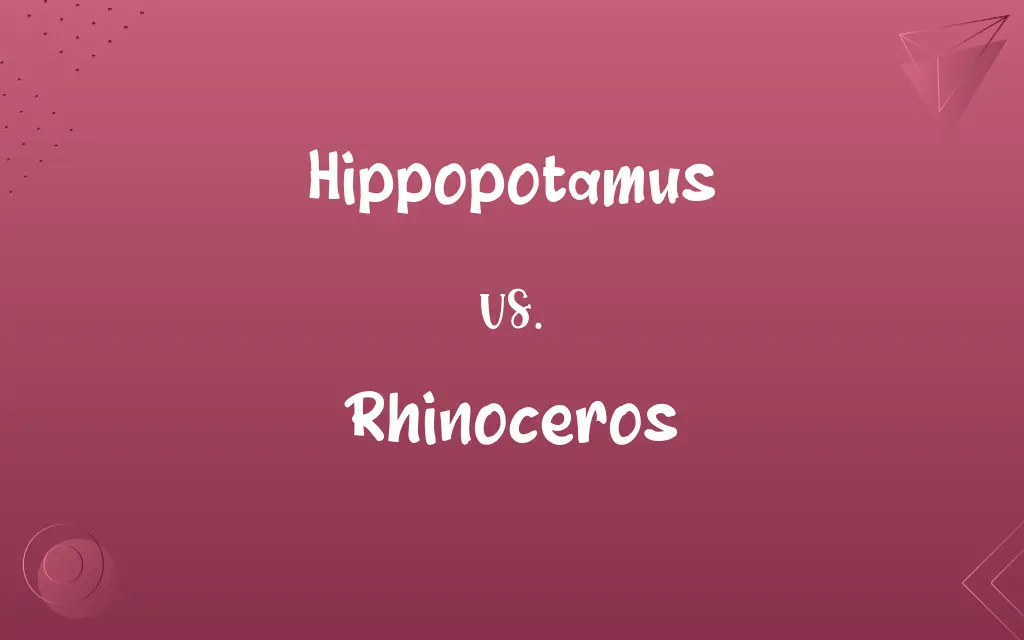Hippopotamus vs. Rhinoceros: Know the Difference

By Shumaila Saeed || Updated on December 25, 2023
The Hippopotamus is a large, mostly herbivorous, semi-aquatic mammal known for its barrel-shaped torso, whereas the Rhinoceros is known for its large size and characteristic horn(s) on its snout.

Key Differences
Hippopotamuses are amphibious creatures primarily found in sub-Saharan Africa, spending much of their time in water, while Rhinoceroses are more terrestrial and found in both Africa and Asia.
Shumaila Saeed
Dec 13, 2023
The skin of a Hippopotamus is hairless and moist, adapted for aquatic environments, whereas Rhinoceroses have thicker, protective skin with some species having more hair.
Shumaila Saeed
Dec 13, 2023
Hippopotamuses are predominantly herbivorous, grazing on grasses, while Rhinoceroses also eat leafy material, branches, and shrubs.
Shumaila Saeed
Dec 13, 2023
The social structure of Hippopotamuses revolves around groups called pods, mostly in water, while Rhinoceroses are generally solitary except for mothers with offspring.
Shumaila Saeed
Dec 13, 2023
Threats to Hippopotamuses include habitat loss and poaching for their teeth, contrasting with Rhinoceroses, where poaching for their horn is a significant threat.
Shumaila Saeed
Dec 13, 2023
ADVERTISEMENT
Comparison Chart
Habitat
Semi-aquatic, mostly found in water
Terrestrial, diverse environments
Shumaila Saeed
Dec 13, 2023
Physical Appearance
Barrel-shaped torso, nearly hairless
Thick skin, one or two horns on snout
Shumaila Saeed
Dec 13, 2023
Diet
Primarily herbivorous, grazing on grasses
Herbivorous, eating leafy material and shrubs
Shumaila Saeed
Dec 13, 2023
Social Structure
Lives in groups (pods), especially in water
Mostly solitary, except when mating or rearing young
Shumaila Saeed
Dec 13, 2023
Conservation Threats
Habitat loss, poaching for teeth
Poaching for horns, habitat loss
Shumaila Saeed
Dec 13, 2023
ADVERTISEMENT
Hippopotamus and Rhinoceros Definitions
Hippopotamus
A Hippopotamus is a large, semi-aquatic mammal known for its massive size and aquatic lifestyle.
We saw a group of Hippopotamuses lounging in the river.
Shumaila Saeed
Dec 08, 2023
Rhinoceros
Rhinoceroses are generally solitary creatures, except for mothers and calves.
A solitary Rhinoceros stood impressively in the clearing.
Shumaila Saeed
Dec 08, 2023
Hippopotamus
The Hippopotamus has a barrel-shaped body, nearly hairless skin, and spends much time in water.
The Hippopotamus submerged itself in the water to cool down.
Shumaila Saeed
Dec 08, 2023
Rhinoceros
The Rhinoceros is threatened primarily by poaching for its horn.
Conservation efforts are crucial to protect the Rhinoceros from poaching.
Shumaila Saeed
Dec 08, 2023
Hippopotamus
Hippopotamuses are herbivores, primarily feeding on grass.
At night, Hippopotamuses leave the water to graze on land.
Shumaila Saeed
Dec 08, 2023
ADVERTISEMENT
Rhinoceros
A Rhinoceros is a large, heavy mammal notable for its horn or horns on its snout.
The Rhinoceros used its horn to dig for water in the dry savannah.
Shumaila Saeed
Dec 08, 2023
Hippopotamus
Hippopotamuses are known for their large mouths and tusks.
The Hippopotamus opened its mouth wide in a territorial display.
Shumaila Saeed
Dec 08, 2023
Rhinoceros
Rhinoceroses have thick, protective skin and are found in both Africa and Asia.
We observed a Rhinoceros with its thick skin almost looking like armor.
Shumaila Saeed
Dec 08, 2023
Hippopotamus
A large, chiefly aquatic African herbivorous mammal (Hippopotamus amphibius) having thick, dark, almost hairless skin, short legs with four toes, and a broad, wide-mouthed muzzle. Also called river horse.
Shumaila Saeed
Dec 08, 2023
Rhinoceros
Rhinoceroses are herbivores, consuming a variety of vegetation.
The Rhinoceros was browsing on shrubs and leaves.
Shumaila Saeed
Dec 08, 2023
Rhinoceros
Any of several large thick-skinned ungulate mammals of the family Rhinocerotidae, having one or two upright horns on the snout, and including the black rhinoceros (Diceros bicornis) and white rhinoceros (Ceratotherium simum) of Africa, the Indian rhinoceros (Rhinoceros unicornis) of India and Nepal, and the Javan rhinoceros (Rhinoceros sondaicus) and Sumatran rhinoceros (Dicerorhinus sumatrensis) of Southeast Asia.
Shumaila Saeed
Dec 08, 2023
Hippopotamus
A large, semi-aquatic, herbivorous (plant-eating) African mammal (Hippopotamus amphibius; common hippopotamus).
Shumaila Saeed
Dec 08, 2023
Rhinoceros
Any of several large herbivorous ungulates native to Africa and Asia of the five extant species in the three extant genera in the family Rhinocerotidae, with thick, gray skin and one or two horns on their snouts.
Shumaila Saeed
Dec 08, 2023
Rhinoceros
(paleontology) A member of the superfamily Rhinocerotoidea, including hornless members of the extinct genus Paraceratherium.
Shumaila Saeed
Dec 08, 2023
Hippopotamus
A large, amphibious, herbivorous mammal (Hippopotamus amphibius), common in the rivers of tropical Africa. It is allied to the hogs, and has a very thick, naked skin, a thick and square head, a very large muzzle, small eyes and ears, thick and heavy body, and short legs. It is supposed to be the behemoth of the Bible. Called also zeekoe, and river horse. A smaller species (Hippopotamus Liberiencis) inhabits Western Africa.
Shumaila Saeed
Dec 08, 2023
Rhinoceros
Any pachyderm belonging to the genera Rhinoceros, Atelodus, and several allied genera of the family Rhinocerotidæ, of which several living, and many extinct, species are known. They are large and powerful, and usually have either one or two stout conical median horns on the snout.
Shumaila Saeed
Dec 08, 2023
Hippopotamus
Massive thick-skinned herbivorous animal living in or around rivers of tropical Africa
Shumaila Saeed
Dec 08, 2023
Rhinoceros
Massive powerful herbivorous odd-toed ungulate of southeast Asia and Africa having very thick skin and one or two horns on the snout
Shumaila Saeed
Dec 08, 2023
Hippopotamus
The Hippopotamus is one of the heaviest land animals.
A full-grown Hippopotamus can weigh up to three tons.
Shumaila Saeed
Dec 08, 2023
Repeatedly Asked Queries
Are Hippopotamuses dangerous?
Yes, they can be very aggressive, especially when threatened.
Shumaila Saeed
Dec 13, 2023
How do Hippopotamuses adapt to aquatic life?
They have adapted with webbed feet and the ability to hold their breath underwater.
Shumaila Saeed
Dec 13, 2023
Where do Hippopotamuses live?
Hippopotamuses live in rivers and lakes in sub-Saharan Africa.
Shumaila Saeed
Dec 13, 2023
What role do Rhinoceroses play in the ecosystem?
They help shape the landscape by grazing and create water holes used by other animals.
Shumaila Saeed
Dec 13, 2023
What are the main species of Rhinoceros?
Key species include the White, Black, Indian, Javan, and Sumatran Rhinoceros.
Shumaila Saeed
Dec 13, 2023
How long can Rhinoceroses live?
They can live for up to 40-50 years in the wild.
Shumaila Saeed
Dec 13, 2023
What is the primary threat to Rhinoceroses?
Poaching for their horns is the biggest threat.
Shumaila Saeed
Dec 13, 2023
Can Rhinoceroses swim?
Unlike Hippopotamuses, Rhinoceroses are not adapted for swimming.
Shumaila Saeed
Dec 13, 2023
Can Rhinoceroses see well?
Rhinoceroses have poor eyesight but a keen sense of smell and hearing.
Shumaila Saeed
Dec 13, 2023
Do Rhinoceroses have a mating season?
They do not have a specific mating season and can mate throughout the year.
Shumaila Saeed
Dec 13, 2023
Are Hippopotamuses solitary or social animals?
They are social animals, living in groups called pods.
Shumaila Saeed
Dec 13, 2023
Are Rhinoceroses fast runners?
Despite their size, they can run at speeds of up to 30-40 mph.
Shumaila Saeed
Dec 13, 2023
Do Hippopotamuses have natural predators?
Adult Hippopotamuses have few natural predators due to their size and aggression.
Shumaila Saeed
Dec 13, 2023
How do Hippopotamuses communicate?
They use vocalizations, grunts, and bellows to communicate.
Shumaila Saeed
Dec 13, 2023
What is the gestation period for a Hippopotamus?
The gestation period is about 8 months.
Shumaila Saeed
Dec 13, 2023
What is the weight range of a Hippopotamus?
They can weigh between 1.5 to 3 tons.
Shumaila Saeed
Dec 13, 2023
How do Rhinoceroses use their horns?
They use them for defense, digging, and to assert dominance.
Shumaila Saeed
Dec 13, 2023
How are Hippopotamuses and Rhinoceroses different in their habitat preferences?
Hippopotamuses prefer water bodies, while Rhinoceroses are more adaptable to various terrestrial habitats.
Shumaila Saeed
Dec 13, 2023
Share this page
Link for your blog / website
HTML
Link to share via messenger
About Author
Written by
Shumaila SaeedShumaila Saeed, an expert content creator with 6 years of experience, specializes in distilling complex topics into easily digestible comparisons, shining a light on the nuances that both inform and educate readers with clarity and accuracy.






































































